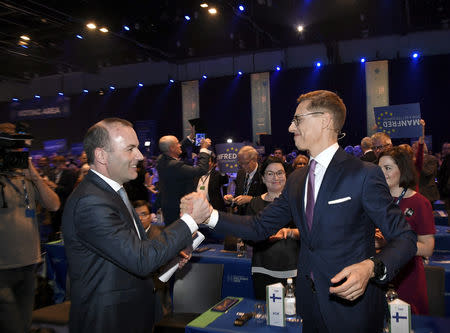Merkel ally poised to win centre-right backing for EU's top job
By Robin Emmott and Philip Blenkinsop
HELSINKI (Reuters) - A reserved Bavarian who has modelled himself on Germany's pragmatic chancellor is set to win the backing of Europe's centre-right parties on Thursday to stand in the race to become European Commission president, according to voting projections.
German EU lawmaker Manfred Weber is vying against former Finnish prime minister Alexander Stubb to be endorsed as the European People's Party's (EPP) top candidate for the EU's most influential job, the head of the bloc's executive overseeing laws and trade deals.
Both made their pitches at a congress in Helsinki with a message to reject the anti-immigrant populists whom they see as challenging social democracy in Europe and threatening their values of openness and tolerance.
"I want to open a new chapter for a better Europe: no more anger," Weber told delegates of Europe's biggest political force, seeking to emulate Angela Merkel's calm style of compromise which appeals to conservatives across the EPP.
Almost two thirds of the EPP members' 734 votes could go to Weber, according to informal projections by party officials, counting Germany's outsized presence in the composition of the group, with more than 80 votes.
Merkel has publicly backed Weber.
But with the EPP losing influence in France and Spain, the rise of far-right parties across Europe, and with populists in its ranks in Hungary, Europe's biggest political force faces accusations that it represents out-of-date politics.
"DIFFICULT ERA"
Fifty-year old Stubb, a prolific Twitter user who cuts a youthful, sporty figure, is the clear underdog against Weber, 46, who leads the EPP group in the European Parliament and won a standing ovation from delegates.
"We're living in a very difficult era ... please stand up on the barricades, defend liberal democracy and the rule of law," Stubb said, a day after the EPP issued a warning that it could consider expelling Hungarian Prime Minister Viktor Orban's Fidesz party for eroding democracy.
The unassuming Weber, who speaks German and English, also lacks the experience of Juncker or the charisma of polyglot Stubb, who speaks English, German, French, Swedish and Finnish.
But the strong social and networking skills of Stubb have also got the better of him. He was judged too overwhelming for the modesty of Finnish politics and ditched by his own party in 2016 after a series of missteps.
The decision of who gets the Commission job also depends on the EU's national leaders.
Centrist French President Emmanuel Macron, who swept aside France's traditional political parties with his 2017 victory, rejects a 2013 European Parliament agreement that the parliamentary election winner should take the Commission job.
Under that deal, designed to bring the European Union closer to voters, whichever group comes top in the European assembly's election in May will have first chance to try to obtain parliamentary backing to be Commission president.
The EPP is expected to remain the largest grouping.
Such a contest is aimed at making the vote more relevant to citizens, who have turned out in ever smaller numbers to vote in European elections since the first were held in 1979.
(Additional reporting by Jussi Rosendahl; Editing by Raissa Kasolowsky)



